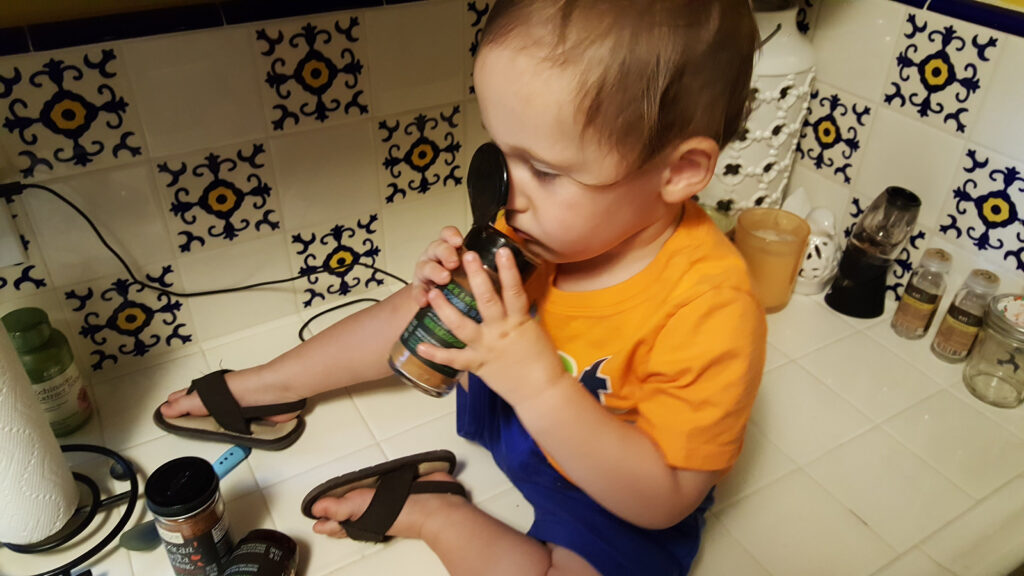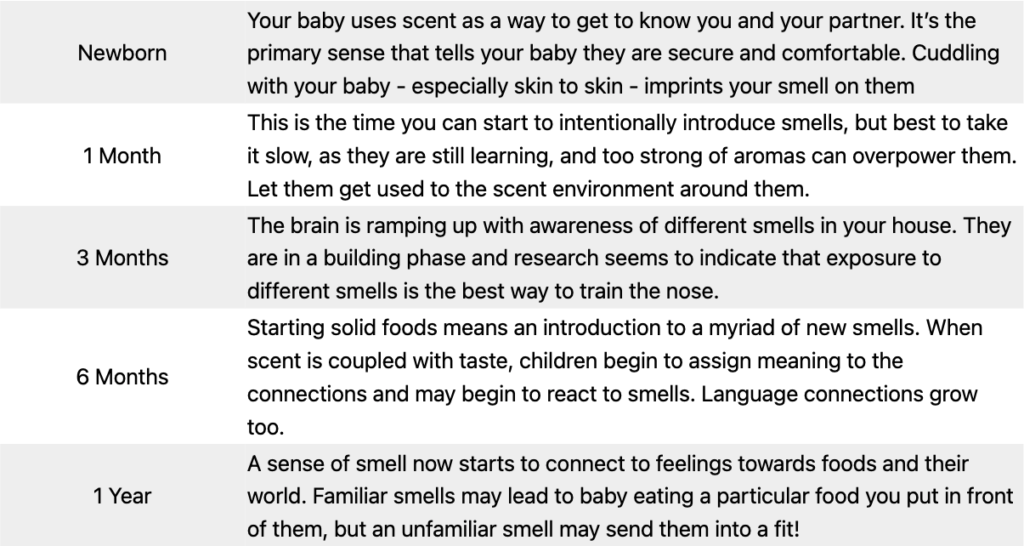A SENSE OF SMELL
Scientists estimate that the human eye can see about 7 million different colors, and that the human ear is sensitive to about half a million tones. The eyes and ears are incredible, but have we taken other senses for granted?
How sensitive is the nose? It was long thought that humans could sense around 10,000 odors, but work in 2014 showed that the nose can likely differentiate about 1 trillion different odors. For instance, the nose can sense a chemical, called geosmin, released in rainfall (the scent of air after rain) in 5 parts per trillion (visual here). Sharks can sense blood in water 1 part per million. In other words, the human nose can detect the “scent of rain” about 200,000x above the ability of a shark detecting blood in water.
Babies start to develop this incredible sense of smell in the womb. Receptors that detect smell form by week 10 in the womb. The first scents the baby becomes familiar are scents of mom through breathing and swallowing amniotic fluid. Within two weeks of birth your baby could tell the difference between mom’s milk and another mother’s milk, and show preference.
Time to explore the DAD scent, and the odorific world in general!
TL;DR
Smell is the sense most tied to memory and emotion.
Explore ways to use it for connection / bond building.
Access the complete audio series on Soundcloud and Apple Podcasts (Coming Soon)
WHAT (4 min)
Building a keen sense of smell is an important part of human development. It also has deep ties into our memories, emotions, and social connections. You can use scent not only to help your child learn about the world, but also connect more deeply. Here are some ways to do that.
Try This
“Spice Rack”
Pull out some safe, natural items with a pleasing smell from the “spice rack” (vanilla, cinnamon, paprika, herbs like oregano). Grab your sensation of choice – bring it up to baby’s nose. Let them smell it. When they smell, let them smell in silence – it takes ALL of their focus to wrap their mind around this new experience. Describe the smell, what it is, what it reminds you of (scent is heavily tied to memory). Focus, smell, talk. That’s it. Take it slow, be safe, have fun.
CAUTION: Start with natural items for exploring scent. Be wary of essential oils, lotions, perfumes, or anything that is highly concentrated. If in doubt research for allergy potential or other negative interactions. There are emerging guidelines on avoiding essential oil use for kids under 3 months, and limiting essential oils and extracts to kids under 2 years.

Scent of Dad (and Traveling Dads)
The baby came out of the womb with the ability to smell mom – it’s called a maternal scent. Similar to the baby knowing mom’s voice at birth, but less of yours – your paternal (dad) scent has to be earned. It could just be your natural scent – it could be something from the spice rack. Pick a scent to associate with you, share positive moments around it. Odor can also be a safety signal, so if you are away from time to time you can sleep with baby’s clean swaddles or other articles, and they will be able to connect with you, and find safety in you, through your Dad scent, while you are away.
Scents of the World
Additional ways to aid in building a stronger sense of scent – find some natural items in the kitchen (coffee, ripe fruit, vegetables, flowers), grab safe household items (crayons, baby shampoo, leather, natural odor candle), draw attention to the in-the-moment smells of the world (rain, sewage). Focus, smell, talk.
As a father, embracing the experiences of exploring the world through scents (and sound and sight) promote the personal development of being able to slow down, to take pause at the world around you, to enjoy simple moments with your child. Developing these skills now will set a foundation for your resilience when times are more trying or rushed. Great outcomes for your child are tightly tied to how you develop and see yourself as a dad. No one starts as the father they want to become, they grow into that role over years of practice, through failure, success, learning about oneself, their child, and family unit. It’s a worthwhile journey, and I encourage you to take the time to stop and smell the roses.

WHY (2 min)
The development of our ability to smell starts in the womb and this is what the progression looks like in the first year.
Here are few interesting things about the sense of smell.
Over time, humans develop a highly attuned sense of smell that is deeply tied to memory, emotions, and directs us to things that we know are safe and healthy. Smell also helps us avoid things we can’t see, hear or feel, such as spoiled milk or leaking natural gas. Smell is also a contributor to how we taste – it creates the “flavor” of food. What is generally categorized as “taste” is a bundle of sensations: not just the qualities of taste (sweet, sour, bitter, salty, savory, etc) perceived by the tongue, but also the smell, texture and temperature of food. The “coloring” of a taste happens through the nose. Flavor is produced when taste is combined with smell. If you’ve experienced a stuffy nose, you’ve likely had your sense of flavor reduced.
It is believed that 5% of our genetic code is dedicated to passing on information around scent. Animal studies have also shown that scents associated with trauma, stress, and abuse can be passed down to offspring. In one experiment, a mouse that experienced fear while exposed to a certain scent, then passed the odor based fear response down two (2) generations. The mice offspring showed an innate fear response from simply being exposed to the odor alone! Of course, these and other animal studies don’t always translate exactly to human experiences, but when combined with other areas of science, we can start to explore the implications in how scent impacts behavior.
A study in 2016 provided evidence supporting the idea that experiences around smells can shape how we respond emotionally to odors. When it comes to scent experiences, if it’s firing it’s wiring and the context of the scent matters in how the scent wires in the brain. Good and bad experiences can be wired to make an innately bad odor good, or an innately good odor bad. When we couple this with evidence that scent can be trained as a safety signal, to reduce fear and anxiety, we can start to build awareness of how scent can be a powerful tool in building connection and resilience, especially when combined with the presence of a caring and attentive father. .
When it comes to the social connections and relationship aspects of smell, other studies have provided evidence that the odors of another human, assuming the non-stinky ones, appear to be processed in the area of the brain that processes social information, and not in the areas of the brain that smell is typically processed.
Are there sensitive periods for scent? Of course! It appears that the sensitive period for development is from the womb until around 8-years old. In our mid-20’s our sense of smell tends to start declining with age. The good news is that your sense of smell, like other senses, can be sharpened with the appropriate training and experiences. In 2009, Dr Thomas Hummel of the University of Dresden, Germany ran a study with individuals whose sense of smell had been damaged by a trauma. He was able to show that individuals who underwent consistent scent training experiences showed improvement in olfactory (scent) function.
Babies, at birth, are believed to be highly sensitive only to specific smells, and sensitivity to a wider range develops over time. Evidence suggests that exposing babies to new natural odors may have a positive effect, especially over time, but that much of what babies “prefer” initially may have been passed on from mother to child through a combination of breastfeeding, cultural behavior, and genetics. Additional studies have shown that the power of scent can drive a baby’s choices (yes they can make choices) in the earliest days. Many food tastes and smells can be passed on to babies in the early days through breast milk. Eating carrots, for instance, can pass some carrot related flavor to the baby through breastmilk, giving the baby exposure to some of the chemicals of flavor of carrots, which may reduce distaste to carrots later. New, less rigorous studies, also hint that scent exposure may reduce pickiness of eating. Smelling of food before eating may lessen the barrier to trying them. In other words, taste and smell are intertwined, and can be shaped by experiences as well as influence our behaviors. Below is the general timeline.

Providing our senses with experiences is a big part of early human development. You may hear the term “sensory play” as your baby grows and becomes exposed to schools and/or play dates, etc. While these usually refer to “touch” only, you can start the sensory experiences across all senses at any age, but mainly – it’s a powerful, fun, and easy way to enhance that daddy-kiddo bond and uplevel Dad Skill status!
HELPFUL TO KNOW
This section has tidbits from around the web that are typically on Dads minds.
Dad Challenge: Nasal Breathing
Pay attention to your breath this week. Notice how it changes, when it changes. Just notice it. If you want to up the game a little, try to limit the amount of breathing through your mouth for 5 days. Nose in, nose out. Just notice, see how you feel. Walking through the house, reading this, washing bottles, changing a diaper, being there through some crying. Just notice it.
Intriguing Books
If you’d like to go deep into the science (because you have sooo much extra time) and understanding of the mouth and nose, how we humans have changed (spoiler: our mouths have gotten smaller), or the history behind nasal vs mouth breathing, here are two incredibly well researched and written books on the topic. Both also question conventional wisdom. Read Jaws for how our mouths work and Breath (easier read) for how we use the mouth, nose, and lungs.
Enjoying FD? Help keep me caffeinated.
This site costs $1,788 a year to host, plus time. Your support keeps it ad-free and growing.